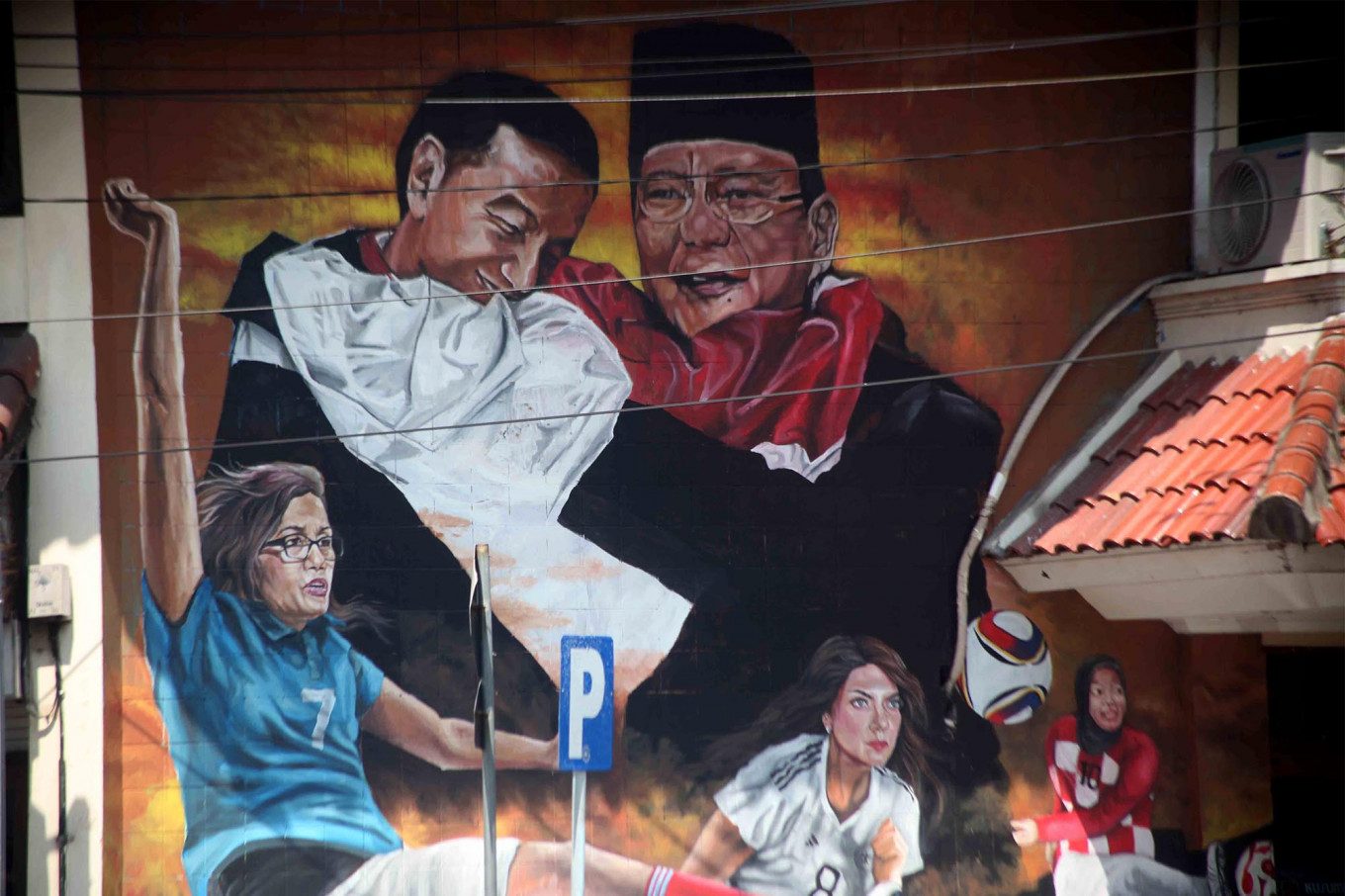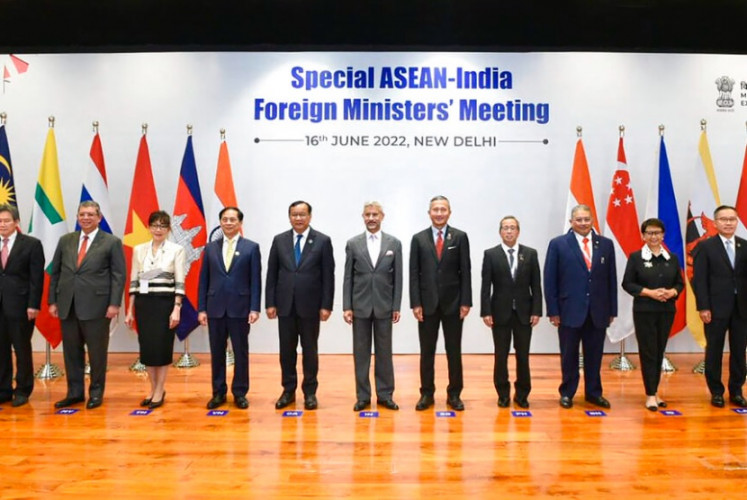Ensuring 'Pakde' —and all of us– pass the 'litmus test'
Indonesians need to do their bit to avoid us sliding right back to where we left off — authoritarianism under a popular leader.
Change Size
 Sweet embrace: A mural shows 2019 presidential rivals Joko “Jokowi” Widodo and Prabowo Subianto. (JP/Maksum Nur Fauzan)
Sweet embrace: A mural shows 2019 presidential rivals Joko “Jokowi” Widodo and Prabowo Subianto. (JP/Maksum Nur Fauzan)
P
ost-holiday conversations were full of praise for shortened trips to Central and East Java, thanks to the new leg of a toll road. President Joko “Jokowi” Widodo is indeed reaping credit ahead of his second shot at office in the April elections — while his supporters or “Jokowers” mock the rival camp, saying that Prabowo Subianto has nothing to show but criticism against the incumbent.
However, as the campaigns step up, Jokowers quietly express worry that the campaigners and cyberarmies of Prabowo might outdo them in their desperation over what is likely the retired general’s last-ditch effort to become president.
Recent rumors of millions of ballots marked with votes for the incumbent, who has earned the affectionate Javanese title of Pakde (uncle), were denied by the General Elections Commission, but more distractions are feared amid preparations for the presidential and legislative elections. Involving almost 193 million eligible voters, it is likely the world’s biggest nightmare in election logistics.
Keeping peace during the remaining campaigning period is hard enough; the aftermath of whoever wins and loses may be worse.
We still lack clues to better manage differences. Also, temptations are strong to clamp down on disagreeable parties, but outside campaigners, Indonesians need to do their bit to avoid us sliding right back to where we left off — authoritarianism under a popular leader.
It is an uncomfortable reminder, especially for Jokowers who feel riled at what they perceive as a “fire hose of falsehoods” aimed at the incumbent.
However, preventing the return of old ways must remain our utmost struggle. A new book on saving the United States reminds us that unless we can decide that bashing the enemy is only a “Pyrrhic victory”, we could land right back into the days when dissent was suppressed by a strong leader and his loyalists.
In How Democracies Die: What History Reveals about Our Future, Steven Levitsky and Daniel Ziblatt warn Americans their nation could worsen, with US President Donald Trump only intensifying signs that began long ago of “constitutional hardball” and the trampling of “mutual toleration and forbearance”. In reviewing US history the two blame Republicans for embracing populist figures as easy vote grabbers and Democrats for failing to firmly and loudly reject extremist trends.
Dubbed the world’s third-largest democracy, Indonesia should be on constant alert for leaders who reinstate old ways in dealing with anything they perceive or claim as a threat.
Although the aforementioned professors don’t refer to Indonesia in examining nations in democratic and authoritarian periods, citizens of any nation who fear regressing signs in their country could use their “litmus test”.
The scholars list questions on whether leaders show authoritarian trends. Even pro-Jokowi supporters claiming to be reformists would have to answer “yes” to some of the questions, with an army of excuses; while for others it is a resounding “no”.
The questions are grouped under four topics: “rejection of or weak commitment to democratic rules of the game; denial of the legitimacy of political opponents; toleration or encouragement of violence; [and] readiness to curtail civil liberties of opponents, including media”.
So while we pity neighboring Thais whose looming elections may result in extended military rule, we similarly risk jail for rants on social media. The Southeast Asia Freedom of Expression Network (Safenet) recorded that by early November 2018, 380 citizens had been charged under the Electronic Information and Transactions Law since it came into force in 2008; the law was even strengthened under Jokowi’s rule.
Supporters of both presidential candidates would shout “no” to the writers’ question of whether their leaders would endorse extra-constitutional means to change the government. Yet we’re reminded how authoritarian rule can creep up on us slowly through low-profile, legal means. We’ve been there, done that for more than three decades; yet amid fears of the election results many are thirsting for “the winner takes all”.
At least the teasing of each other’s democratic credentials among both camps might help curb violence. In the last “212” rally of Islamists, who support the #2019GantiPresiden (2019 change president) movement, participants convincingly carried big black flags adorned with the Islamic acknowledgement of God and his Prophet, in identical color and calligraphy to the flags of the banned organizations, Hizbut Tahrir Indonesia (HTI) and the Islamic State movement, both of which call for a caliphate.
Earlier, assaulters of demonstrators carrying the flag had been scolded for attempting to desecrate the sacred text. In last December’s rally supporters of Jokowi’s ban on the HTI — the first victim of the revived New Order policy of banning organizations — resisted fussing over the flags.
The above writers say since citizens are unlikely to affect real change, preserving basic democratic norms should be the responsibility of the major political parties. But that’s laughable for Indonesians frustrated with their parties; it’s better to join the more level-headed critics of rulers and aspiring rulers.
Citizens and the media would particularly need to watch the incumbent, given his power, privileges and popularity. Unfortunately we have normalized blatant violations of media independence, a basic pillar of democracy. Senior editors have joined Jokowi’s campaign team, so have MetroTV boss Surya Paloh and MNC Group owner Hary Tanoesoedibjo, both political party leaders.
By neglecting and accepting violations of the rules of the democratic game, many of us clearly like elements of strong leadership when it favors us — unless we can somehow refrain from sacrificing hard-won reforms.








